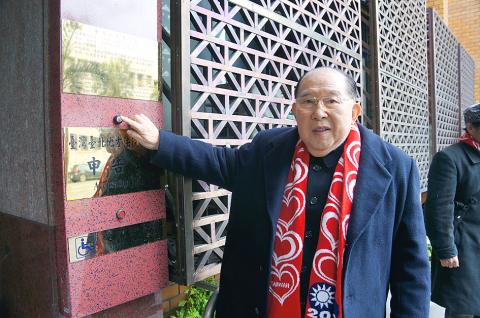George Wang (王可富), lawyer and former legal consultant to Ma Ho-ling (馬鶴凌), yesterday filed suit against 13 elite members of the Chinese Nationalist Party (KMT) — including President Ma Ying-jeou (馬英九) — accusing them of breach of trust and embezzling NT$200 billion (US$6.3 billion) worth of party assets.
“Ma Ying-jeou is behind the unexplained depreciation of party assets,” Wang said as he filed the suit with the Taipei District Prosecutors’ Office.
Ma Ho-ling, who died in 2005, was Ma Ying-jeou’s father.

Photo: Chien Li-chung, Taipei Times
Wang said he had sought meetings with Ma Ying-jeou to address the party’s lingering issues with its potentially ill-gotten assets, as well as to tackle problems associated with veterans’ pensions, but has been rejected three times.
A 56-year KMT member, Wang said that his annual membership fees were part of the party’s assets, which he said shrank from NT$200 billion in 2000 to just NT$27 billion in 2006 for unknown reasons.
He added that the KMT was wrong for appropriating public property into party assets, properties he said must be returned to the state.
Wang said that Ma Ying-jeou, KMT chairman from 2006 until early last month, and 12 other prominent figures in the KMT’s ruling body between 2000 and 2006 — including former vice president Lien Chan (連戰) — must be held responsible for the unexplained plunge in value and the damage done to members.
Wang highlighted differences among various reports of asset value, saying that former KMT treasurer Liu Tai-ying (劉泰英) once estimated holdings to be worth NT$200 billion, while New Taipei City Mayor Eric Chu’s (朱立倫) assessment was just NT$100 billion, Wang said.
Moreover, he added, the party’s own assets report — submitted to the Ministry of the Interior in 2013 — tallied a total value of just NT$26.8 billion.
“The figure showed a steep plummet from Liu’s and Chu’s estimations,” Wang said.
Saying that no party assets were returned to the state — nor used for charity — between 2000 and 2006, Wang questioned the cause of their plummeting value.
He called on the Taipei District Prosecutors’ Office to summon Liu, Chu and former president and former KMT chairman Lee Teng-hui (李登輝) for questioning to calibrate and clarify what happened to the party’s assets since Lee stepped down as chairman in 2000.
Besides Ma Ying-jeou and Lien, Wang’s suit named former KMT chairman Wu Poh-hsiung (吳伯雄) and other KMT officials, including Chiang Ping-kun (江丙坤), John Kuan (關中), Lin Feng-cheng (林豐正) and Chan Chun-po (詹春柏). KMT Vice Secretary-General Lin Te-jui (林德瑞) also made the list.
This story has been corrected since it was first published.

A preclearance service to facilitate entry for people traveling to select airports in Japan would be available from Thursday next week to Feb. 25 at Taiwan Taoyuan International Airport, Taoyuan International Airport Corp (TIAC) said on Tuesday. The service was first made available to Taiwanese travelers throughout the winter vacation of 2024 and during the Lunar New Year holiday. In addition to flights to the Japanese cities of Hakodate, Asahikawa, Akita, Sendai, Niigata, Okayama, Takamatsu, Kumamoto and Kagoshima, the service would be available to travelers to Kobe and Oita. The service can be accessed by passengers of 15 flight routes operated by

GIVE AND TAKE: Blood demand continues to rise each year, while fewer young donors are available due to the nation’s falling birthrate, a doctor said Blood donors can redeem points earned from donations to obtain limited edition Formosan black bear travel mugs, the Kaohsiung Blood Center said yesterday, as it announced a goal of stocking 20,000 units of blood prior to the Lunar New Year. The last month of the lunar year is National Blood Donation Month, when local centers seek to stockpile blood for use during the Lunar New Year holiday. The blood demand in southern Taiwan — including Tainan and Kaohsiung, as well as Chiayi, Pingtung, Penghu and Taitung counties — is about 2,000 units per day, the center said. The donation campaign aims to boost

ENHANCING EFFICIENCY: The apron can accommodate 16 airplanes overnight at Taoyuan airport while work on the third runway continues, the transport minister said A new temporary overnight parking apron at Taiwan Taoyuan International Airport is to start operating on Friday next week to boost operational efficiency while the third runway is being constructed, the Ministry of Transportation and Communications said yesterday. The apron — one of the crucial projects in the construction of the third runway — can accommodate 16 aircraft overnight at the nation’s largest international airport, Minister of Transportation and Communications Chen Shih-kai (陳世凱) told reporters while inspecting the new facility yesterday morning. Aside from providing the airport operator with greater flexibility in aircraft parking during the third runway construction,

American climber Alex Honnold is to attempt a free climb of Taipei 101 today at 9am, with traffic closures around the skyscraper. To accommodate the climb attempt and filming, the Taipei Department of Transportation said traffic controls would be enforced around the Taipei 101 area. If weather conditions delay the climb, the restrictions would be pushed back to tomorrow. Traffic controls would be in place today from 7am to 11am around the Taipei 101 area, the department said. Songzhi Road would be fully closed in both directions between Songlian Road and Xinyi Road Sec 5, it said, adding that bidirectional traffic controls would